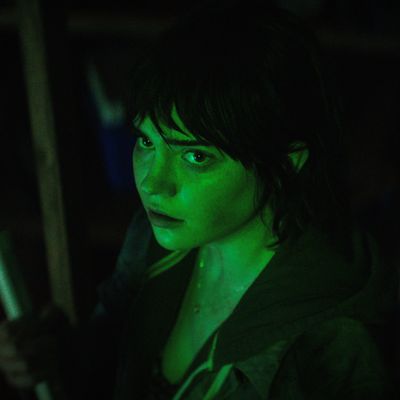
The Boogeyman might be the quietest horror movie I’ve seen in ages. To an unsettling degree. While most genre efforts will occasionally drop the sound from certain scenes in anticipation of a big, shrieking jump scare, Rob Savage’s film, adapted from a Stephen King short story, lives in the silence. When the characters do talk, they seem to speak mostly in whispers. There’s almost no ambient noise or the incidental sound effects we get in normal movies — those elements that form a psychological safety net when we watch horror, providing a sense that the real world continues to exist. It’s unnerving in ways we don’t expect.
That’s part of the formal idea in The Boogeyman, and up to a certain point, it’s an ingenious, even moving one. Beyond the quiet, the film is dominated by deep shadows and pools of darkness looming in the frame. When someone switches on a light, the glow is so small, dim, and pathetic that it might as well be a visual gag. The bleakness is inescapable, and it exists on a conceptual level as well. The monster in question here is itself mostly undefined, both visually and narratively. We learn relatively little about this thing, aside from the fact that it comes with the darkness. And we barely see it. At one point somebody draws a picture of it. It’s just a rudimentary line sketch with zero detail, but it’s probably the clearest image we have of this movie’s malevolent demon.
But taken together — the darkness, the quiet, the inchoate beast of indeterminate origin — it all makes an effective visual metaphor for grief: No matter what we do, the darkness refuses to go away, and the monsters within it remain unknown and unknowable. That’s a powerful idea, and the rigor with which Savage sticks to his stylistic guns helps the film resonate, at least a little. It’s as if the movie itself can’t shake free of its sadness.
That makes some sense, as the central characters, the Harper family, have recently lost their mother in an accident. The kids, teenage Sadie (Sophie Thatcher) and young Sawyer (Vivien Lyra Blair), have been understandably traumatized, a situation not helped by the fact that their psychiatrist father, Will (Chris Messina), refuses to talk about what happened. Sadie has just returned to high school, where her friends’ initial sympathy quickly curdles into mockery and contempt in the wake of her testiness. Sawyer, for her part, sleeps with a giant glowing orb, and her room is festooned with strings of bulbs and other sources of light to ward off the dark. (This is The Boogeyman, of course, so none of these casts any meaningful amount of light. The girl’s room remains mostly plunged in darkness.)
The vague characterizations and lack of any real dimension to the Harpers’ world might have worked if they weren’t so, so generic. (Cue all the “It’s a movie about trauma” memes.) The screenplay was written by Scott Beck, Bryan Woods, and Mark Heyman, and two of those people are responsible for writing A Quiet Place, another film that uses silence remarkably well and effectively develops its characters based on their dramatic challenges. But that’s a movie with a highly defined world, and it spends an unusual amount of time on establishing its rules. Here, the filmmakers may well be banking on the idea that the less specific they get about these people, the more we will fill in the details ourselves and thus find ways to relate to them. But the Harpers are such an off-the-rack horror family that the refusal to give their lives any shape or texture is a miscalculation. In order for the film’s stylistic conceit to work, the protagonists need to pop more. We need to want them to break free of their grief and find ways out of the darkness.
That is in itself a highly compelling idea, and it’s not like these actors would be incapable of capturing our attention. Messina, for example, is a fine performer; I still think he’s got a chance at an Oscar nomination for his turn in this spring’s Air. But he needs something to do, otherwise he’s just some guy. Unfortunately, the great care clearly given to The Boogeyman on a cinematic level is shortchanged by its empty, pro forma script. And when the picture’s bleakness is matched by the hollowness of the people onscreen, the darkness and the silence feel less like a challenge to these characters and more like a comment on the movie’s general vaporousness.
More Movie Reviews
- The Thriller Drop Is a Perfect Addition to the Bad-First-Date Canon
- The Accountant 2 Can Not Be Taken Seriously
- Another Simple Favor Is So Fun, Until It Gets So Dumb


